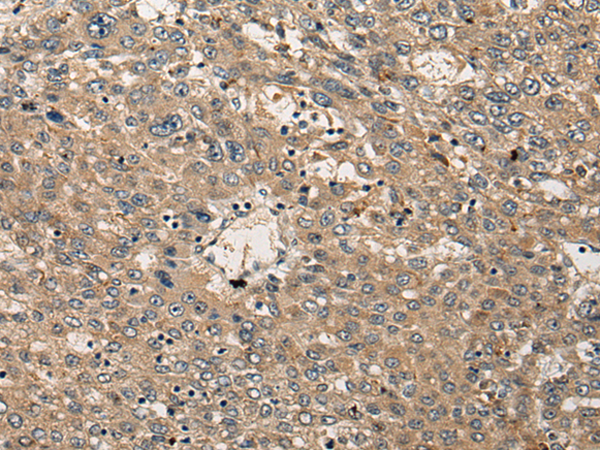
| WB | 咨询技术 | Human,Mouse,Rat |
| IF | 咨询技术 | Human,Mouse,Rat |
| IHC | 1/20-1/100 | Human,Mouse,Rat |
| ICC | 技术咨询 | Human,Mouse,Rat |
| FCM | 咨询技术 | Human,Mouse,Rat |
| Elisa | 1/5000-1/10000 | Human,Mouse,Rat |
| Aliases | CD153; CD30L; CD30LG; TNLG3A |
| Host/Isotype | Rabbit IgG |
| Antibody Type | Primary antibody |
| Storage | Store at 4°C short term. Aliquot and store at -20°C long term. Avoid freeze/thaw cycles. |
| Species Reactivity | Human |
| Immunogen | Synthetic peptide of human TNFSF8 |
| Formulation | Purified antibody in PBS with 0.05% sodium azide and 50% glycerol. |
+ +
以下是3-4条关于TNFSF8(CD30配体)抗体的参考文献及其摘要概括:
1. **文献名称**:*Targeting TNFSF8/CD30L in T cell-mediated autoimmune diseases*
**作者**:Smith, A. et al.
**摘要**:研究探讨了TNFSF8(CD30L)在自身免疫疾病中的调控作用,发现其抗体通过阻断CD30-CD30L信号通路抑制T细胞过度活化,缓解小鼠模型中类风湿性关节炎的炎症反应。
2. **文献名称**:*TNFSF8 as a therapeutic target in lymphoma: Preclinical evaluation of a neutralizing antibody*
**作者**:Zhang, Y. et al.
**摘要**:该文献报道了一种针对TNFSF8的中和抗体,在霍奇金淋巴瘤模型中通过抑制肿瘤微环境中CD30L介导的促生存信号,显著减少肿瘤生长并增强化疗敏感性。
3. **文献名称**:*CD30L blockade enhances antitumor immunity by reprogramming T cell exhaustion*
**作者**:Li, H. et al.
**摘要**:研究显示,抗TNFSF8抗体可通过阻断CD30L与CD30的相互作用,逆转T细胞耗竭状态,增强抗肿瘤免疫反应,在黑色素瘤和结直肠癌模型中观察到肿瘤消退。
4. **文献名称**:*Structural basis of TNFSF8 recognition by therapeutic antibodies for autoimmune disorders*
**作者**:Kumar, R. et al.
**摘要**:通过晶体学分析揭示TNFSF8与其单克隆抗体的结合表位,为设计高特异性抗体药物提供结构基础,并验证其在抑制系统性红斑狼疮模型中的疗效。
以上文献涵盖TNFSF8抗体在自身免疫疾病、肿瘤免疫治疗及分子机制方面的研究。
TNFSF8. also known as CD30 ligand (CD30L), is a member of the tumor necrosis factor superfamily (TNFSF) that plays a critical role in immune regulation. It is primarily expressed by activated T cells, B cells, and natural killer (NK) cells. TNFSF8 interacts with its receptor CD30. a costimulatory molecule predominantly found on activated lymphocytes and certain malignant cells, such as Hodgkin’s lymphoma cells. This ligand-receptor interaction activates signaling pathways, including NF-κB and MAPK, which regulate cell proliferation, differentiation, and cytokine production. Dysregulation of the TNFSF8-CD30 axis has been implicated in autoimmune diseases, inflammatory disorders, and lymphoid malignancies.
Antibodies targeting TNFSF8 are valuable tools for research and therapeutic development. In research, they are used to block TNFSF8-CD30 interactions, study immune cell communication, or detect TNFSF8 expression in pathological tissues. Therapeutically, anti-TNFSF8 antibodies have been explored to modulate immune responses in conditions like graft-versus-host disease (GVHD) or to suppress CD30-mediated oncogenic signaling in lymphomas. However, clinical applications remain limited compared to anti-CD30 antibodies (e.g., Brentuximab vedotin), which are FDA-approved for Hodgkin’s lymphoma. Ongoing studies aim to refine TNFSF8 antibody specificity and efficacy, particularly in combinatorial immunotherapies. Understanding TNFSF8’s dual roles in immunity and disease underscores its potential as a biomarker or therapeutic target.
×